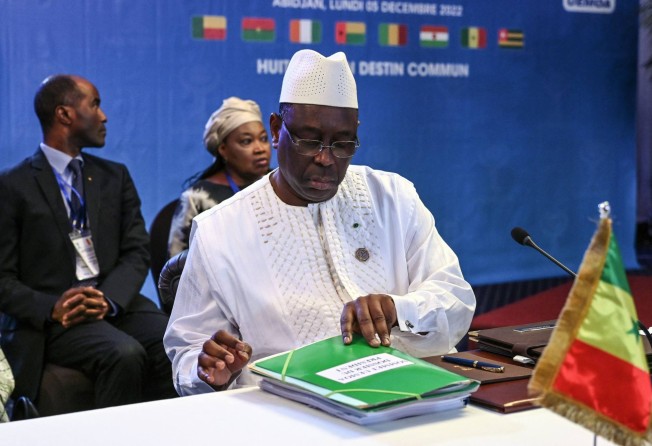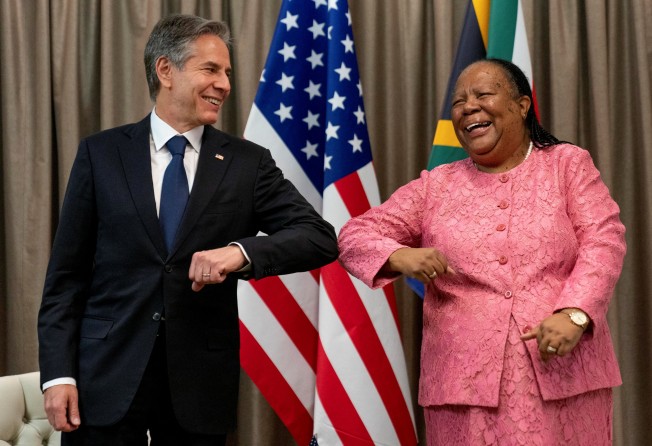
At first US-Africa summit in years, China and its inroads on the continent expected to cast long shadow
- While Washington’s engagement with the continent fell silent, Beijing steadily expanded its economic investment and bilateral trade, analysts say
- Summit gathering 49 government leaders and African Union Commission follows recent US push for greater Africa stature

While China is not officially on the agenda of next week’s US-Africa Leaders Summit in Washington, its presence will cast a long shadow over the proceedings, analysts say.
In a demonstration of the Biden administration’s renewed commitment to the continent, the three-day event held from December 13 to 15 will bring together leaders from 49 governments and the African Union Commission as well as civil society, businesspeople, young leaders and members of the continent’s diaspora. The summit last took place during the Obama administration in 2014.
It follows the publication in August of the US strategy towards sub-Saharan Africa, which asserted that the region’s “governments, institutions, and people will play a critical role in solving global challenges”.
The document warned that China viewed Africa as “an important arena to challenge the rules-based international order, advance its own narrow commercial and geopolitical interests, undermine transparency and openness, and weaken US relations with African peoples and governments”.

In October, the Biden administration in its National Security Strategy named China the US’ “most consequential geopolitical challenge”.
Officials in Washington, however, have carefully avoided mentioning Beijing when describing its relationship with Africa.
Nevertheless, “China remains a looming, inescapable presence,” said W. Gyude Moore, a former Liberian minister of public works now with the Centre for Global Development, a Washington think tank.
Beijing’s Forum on China-Africa Cooperation – its equivalent to Washington’s summit – is held every three years, most recently in November the Senegalese capital of Dakar. Chinese President Xi Jinping, who attended the last edition via video, pledged to increase the value of imports from Africa to US$300 billion by 2025.
Washington’s long absence from high-profile, senior-level engagement with Africa is notable when compared with that of the European Union, China and Japan, which have regularly held summits with countries on the continent in recent years.
“The gap, I think, between 2014 and 2022 certainly is regrettable,” said Judd Devermont, the National Security Council’s senior director for African affairs, referring to the US summits.
China over time has steadily cultivated a growing economic relationship with the continent. In 2009, it surpassed the US as Africa’s largest trading partner, with total bilateral trade exceeding US$254 billion in 2021 – a 35 per cent surge from 2020.
Meanwhile, US-Africa trade reached US$64.34 billion in 2021, marking a 40 per cent increase from 2020, according to the US Census Bureau.
Analysts say Washington’s influence in Africa drastically waned during the administration of Donald Trump. The former president made several disparaging remarks about the continent, and he never visited during his four-year term.
Trump accused China of putting developing countries into “debt traps” by offering unsustainable loans for projects tied to Beijing’s global, trade-themed Belt and Road Initiative. Near the end of his administration, he unveiled the Prosper Africa Initiative, meant to boost two-way trade and investment between the US and Africa. The plan has since stalled.
For its part, the Biden administration has echoed Trump-era rhetoric about debt traps, yet has made clear the US will not force Africa to choose between itself and China.
“From an African perspective, countering China is not a helpful narrative for enhancing US-Africa relations,” said Moritz Weigel of China Africa Advisory, a Germany-based firm.
Earlier this year, Biden proposed a US$600 billion initiative with the G7 – which represents the world’s largest economies – to build infrastructure through the Partnership for Global Infrastructure and Investment. Of that amount, Washington aims to mobilise US$200 billion over the next five years through grants, financing and private-sector investments.
Increasingly, China’s activities in Africa have fanned scepticism across the continent, and there appears to be widespread enthusiasm among Africans for Washington’s summit, as almost everyone who was invited accepted.
But analysts say Washington will find it difficult to keep pace with what Beijing has already done in Africa in terms of infrastructure projects, such as ports, railways, highways and power dams, under its Belt and Road Initiative.
On Friday, US National Security Council spokesman John Kirby said Biden intended during next week’s summit to announce his support for the African Union’s permanent membership in the G20. He added that African voices were sorely missing in international conversations on global issues.
The G20, founded in 1993, is an annual meeting of leaders from 19 major nations plus the EU.
“It’s past time that Africa has permanent seats at the table at international organisations and initiatives,” Kirby added.
Kirby said the US’ decision was a direct response to requests from the African Union president and South Africa, the only current African member of the G20. France announced its support for the AU’s inclusion in November.
However, David Shinn of George Washington University said he did not believe the move had much to do with China.
“The Biden administration is appropriately trying to move away from the US-competition-with-China-in-Africa scenario and deal with African countries on their own merits,” Shinn said of the “Africa-focused decision”.
Next week’s summit will focus on topics encompassing business, democracy and governance, development financing, peace and security, climate change adaptation, health cooperation and health security, space cooperation and food security, among others, according to Devermont.
Regardless of the formal agenda, China will still be discussed in private conversations at the summit, analysts say.
“China currently has Africa’s ear and mouth, so Washington will pretty much focus on the role of Beijing in the continent in its efforts to win the hearts and minds of the leaders who will be attending the summit,” said Adhere Cavince, an international relations analyst based in Nairobi, Kenya.
Moore, the former Liberian minister, said he expected the gathering “to mimic the EU-Africa Summit in announcing an initiative that simply repackages existing commitments”.
But even if G7 countries make good on their multibillion-dollar pledges, the objective of displacing China in Africa is “not likely to be achieved”, said Ovigwe Eguegu of Development Reimagined, a Beijing-based consultancy.
“China-Africa relations is more than just infrastructure”.
“China has an advantage with government leaders in more autocratic African countries because it does not call for human rights reforms and does not espouse Western-style democracy,” said Shinn.
At its summit, the US is likely to announce projects to blunt criticism that initiatives like the Partnership for Global Infrastructure and Investment are largely aspirational rather than practical projects relevant to developing countries, said Cavince.
Weigel of the China Africa Advisory said he expected the summit in Washington to be more inclusive and ambitious than the last edition.
It will be more “inclusive in terms of the number of countries invited and ease of African leaders entering the US and more ambitious in terms of specific commitments, in particular in the areas of renewable energy investment and the expansion of trade relations with the continent”, Weigel said.
But “sustained follow-up” would be crucial to making the most of the summit, Thomas Sheehy of the US Institute of Peace wrote on Wednesday.
Biden has yet to visit Africa as president, although his administration’s top diplomat, Secretary of State Antony Blinken, has gone three times in the last year.